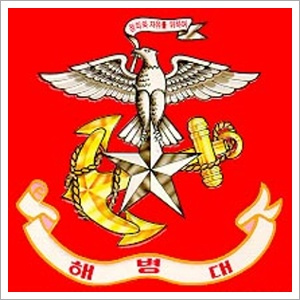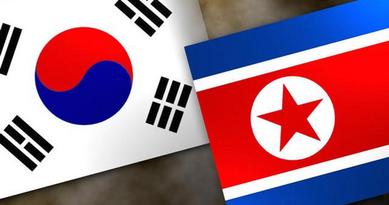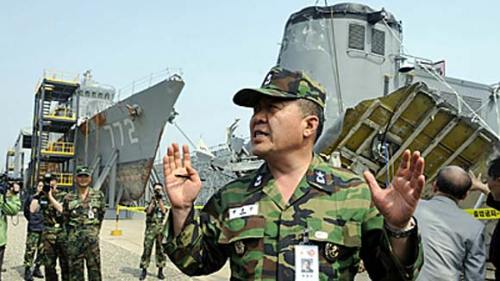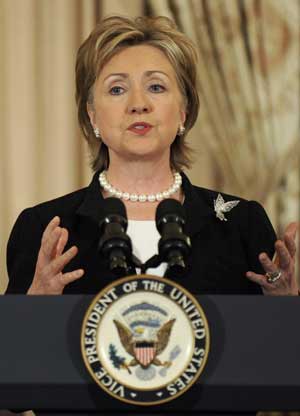
South Korean President Lee Myung-bak said today his nation would report North Korea to the U.N. Security Council and enact new economic sanctions following the finding that the Stalinist state was almost certainly behind the sinking of one of Seoul’s naval vessels, Reuters reported (see GSN, May 21).
(May. 24) – U.S. Secretary of State Hillary Clinton, shown speaking today with Chinese President Hu Jintao, backed actions taken by Seoul in response to North Korea’s alleged sinking of a South Korean warship (Saul Loeb/Getty Images).
South Korea will not conduct any commerce, finance or visitations with the North, and intends to cut the number of personnel at the states’ collaborative industrial site, Lee said. North Korean commercial vessels would also not be allowed in the South’s waters.
The North, already crippled by sanctions and poor financial leadership, could now face additional U.N. sanctions.
“I solemnly urge the authorities of North Korea … to apologize immediately to the Republic of Korea (South Korea) and the international community,” Lee said in a televised address.
His appearance followed the release last week of a report by investigators from South Korea and other states who found that a North Korean torpedo is likely to have sunk the patrol ship Cheonan on March 26, killing 46 sailors (Jack Kim, Reuters I/The Star, May 24).
“We can’t say it is established fact,” one high-level U.S. official who participated in a U.S. intelligence probe of the incident told the New York Times. “But there is very little doubt, based on what we know about the current state of the North Korean leadership and the military” (David Sanger, New York Times I, May 22).
“North Korea (D.P.R.K.) will pay a price corresponding to its provocative acts. I will continue to take stern measures to hold the North accountable,” Lee said.
“From now on, the Republic of Korea will not tolerate any provocative act by the North and will maintain the principle of proactive deterrence. If our territorial waters, airspace or territory are violated, we will immediately exercise our right of self-defense,” he added, according to the Xinhua News Agency (Xinhua News Agency, May 24).
Pyongyang has denied attacking the ship and has threatened to conduct “all-out war” should it be hit with additional penalties, the Yonhap News Agency reported.
South Korean Defense Minister Kim Tae-young said Friday that Seoul and Washington could ratchet up their alert status given the current situation. Moving the alert level from Watchcon-3 to Watchcon-2 would mean that there are signs of a looming danger from the North.
The status was last raised following the North’s second nuclear test blast in May 2009 (Yonhap News Agency, May 21).
U.S. officials have been quick to show support for the South’s position.
“We endorse President Lee’s demand that North Korea immediately apologize and punish those responsible for the attack, and, most importantly, stop its belligerent and threatening behavior,” White House spokesman Robert Gibbs said in a statement today.
“U.S. support for South Korea’s defense is unequivocal, and [President Barack Obama] has directed his military commanders to coordinate closely with their Republic of Korea counterparts to ensure readiness and to deter future aggression,” he said (Jeff Mason, Reuters II, May 24).
Secretary of State Hillary Clinton, in China today, called Seoul’s actions “entirely appropriate,” the Times reported.
“The Republic of Korea can continue to count on the full support of the United States,” she said. “Our support for South Korea’s defense is unequivocal.”
Clinton yesterday and today called on top officials in Beijing to take a harder line on Pyongyang. China traditionally has been North Korea’s primary source of economic support.
“I can say the Chinese recognize the gravity of the situation we face,” Clinton said. “This is a highly precarious situation that the North Koreans have caused in the region; it is one that every country that neighbors or is in proximity to North Korea understands must be contained.”
Other U.S. officials were uncertain whether China believed that it should take action in this case, given its doubts about the ship incident and concerns that penalizing the North could undermine stability in the region (Choe/Landler, New York Times II, May 24).
“We want them to take some steps in the international arena to underscore the seriousness of the matter,” a high-level Obama administration official told the Times. Still, “We have to be realistic about what we can expect” (Mark Landler, New York Times III, May 23).
South Korea’s actions would have little impact if China simply moved to compensate North Korea for its losses, the Times reported (Sanger, New York Times I).
“There’s not much more that can be done to sanction North Korea,”Chinese strategic studies analyst Shen Jiru told the Times. “China basically feels that sanctions or other tough measures only serve to escalate conflict with North Korea, and others tend to agree.”
“The Chinese government so far has done too much to protect North Korea,” countered Beijing-based international relations professor Chu Shulong. “Why should we protect them? Why should we treat them so specially? I think China needs to change its approach” (Sharon LaFraniere, New York Times IV, May 23).
Chinese Premier Wen Jiabao is scheduled to soon visit South Korea and Japan, which has also condemned the apparent North Korean attack, the Washington Post reported Saturday.
Officials from Seoul, Tokyo and Washington are seeking a strategy that would prevent Pyongyang from conducting similar strikes without instigating a wider military conflict on the Korean Peninsula, according to the newspaper.
“I think it’s clear that the South Koreans do not wish to go to war. … They will not take steps that run that risk,” said one high-level U.S. official.












